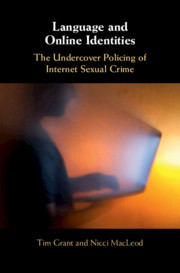Book contents
- Language and Online Identities
- Language and Online Identities
- Copyright page
- Dedication
- Contents
- Figures
- Tables
- Preface
- Acknowledgements
- Table of Legislation
- Table of Cases
- Chapter 1 Introduction
- Chapter 2 Data and Methods
- Chapter 3 Experimental Results
- Chapter 4 Training Identity Assumption
- Chapter 5 Resources and Constraints in Abuse Identity Performance
- Chapter 6 Contexts for Linguistic Investigative Advice
- Chapter 7 Implications and Future Directions
- References
- Index
Chapter 2 - Data and Methods
Published online by Cambridge University Press: 10 February 2020
- Language and Online Identities
- Language and Online Identities
- Copyright page
- Dedication
- Contents
- Figures
- Tables
- Preface
- Acknowledgements
- Table of Legislation
- Table of Cases
- Chapter 1 Introduction
- Chapter 2 Data and Methods
- Chapter 3 Experimental Results
- Chapter 4 Training Identity Assumption
- Chapter 5 Resources and Constraints in Abuse Identity Performance
- Chapter 6 Contexts for Linguistic Investigative Advice
- Chapter 7 Implications and Future Directions
- References
- Index
Summary
Chapter 2 outlines the various sources of our data, which include logs of instant messaging conversations collected from genuine resolved cases of child sexual grooming, from a range of Dark Web fora dedicated to the topic of child sexual abuse, from undercover operations targeting the producers and disseminators of indecent images and videos of children, from role -playing exercises that take place within the Pilgrim Course for online investigators, and from a series of experiments we designed in order to systematically investigate key questions around language and identity performance. The chapter continues by describing our methodological approach to these data, starting with the micro-analysis at the structural level of language, including of vocabulary and orthographic features as we first began setting out in MacLeod and Grant (2012). We then move through our modifications of Searle’s (1969) Speech Act Theory and Gumperz’s (1982) approach to topic management inasmuch as they relate to instant messaging and the operational context, before finally setting out our theory about how these stratified levels of language interface in the performance of identities. Finally, the chapter concludes with a discussion of ethics, both the research ethics of engaging with this area of criminal activity and the operational ethics of assisting the police in these contexts.
- Type
- Chapter
- Information
- Language and Online IdentitiesThe Undercover Policing of Internet Sexual Crime, pp. 26 - 57Publisher: Cambridge University PressPrint publication year: 2020

